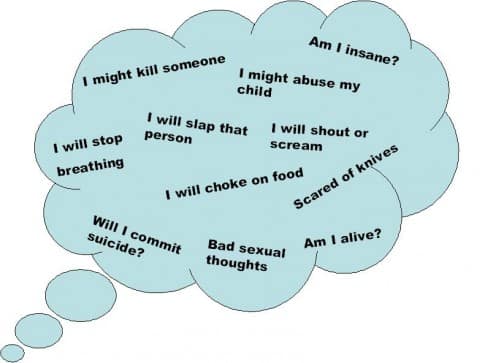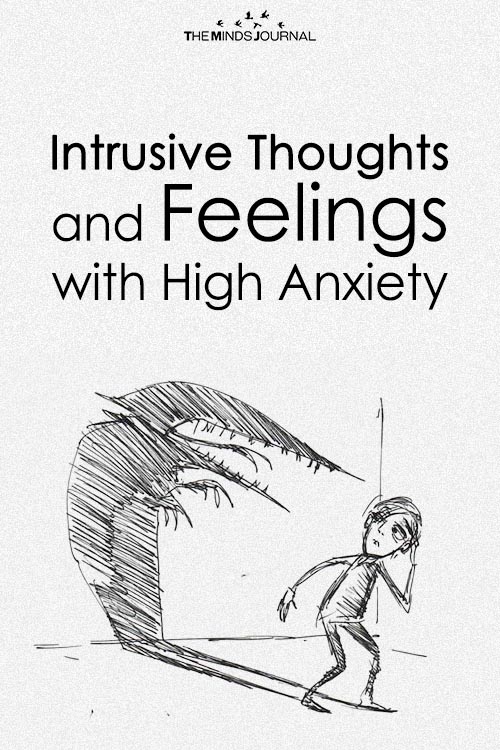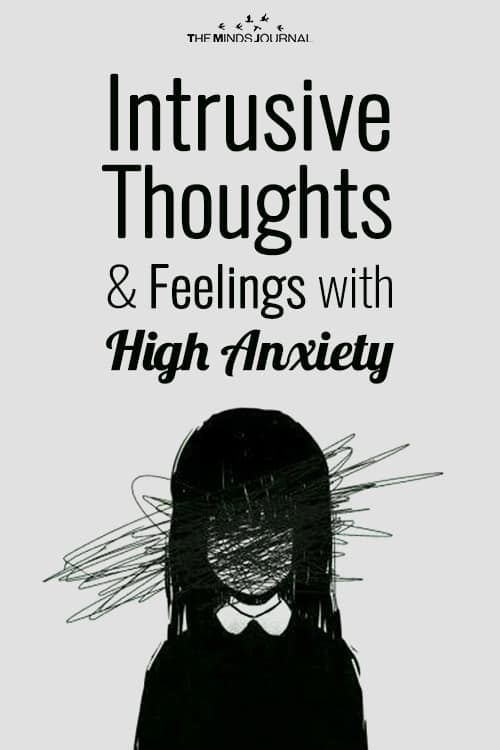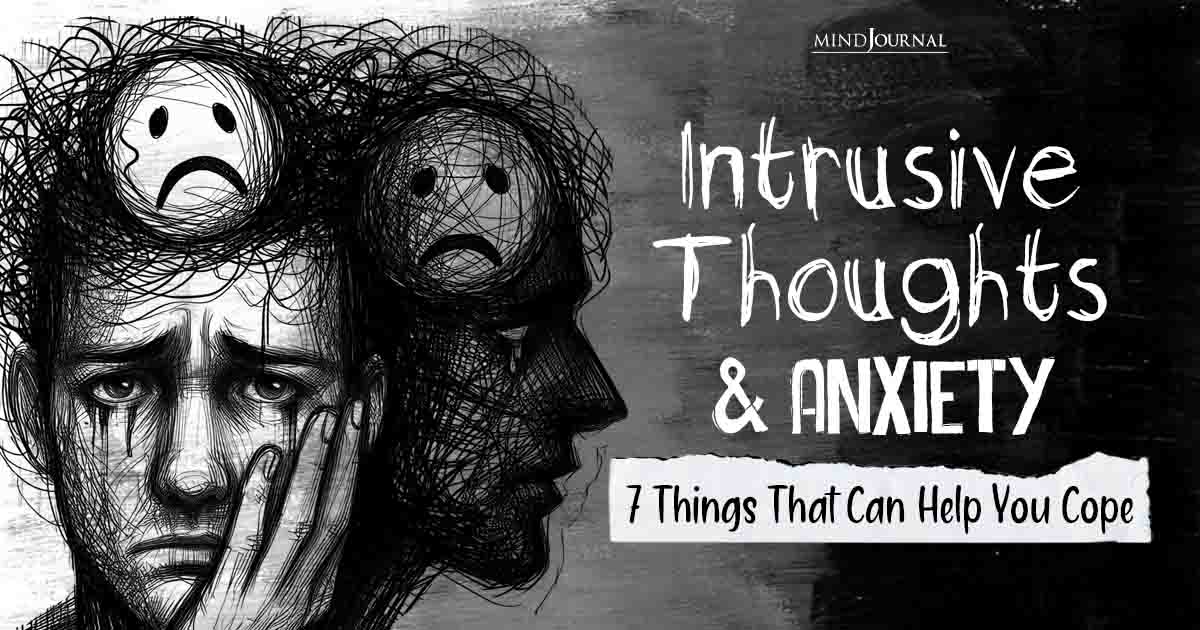When you suffer from high levels of anxiety, many strange thoughts may develop. They are sudden thoughts that flash through your mind, leaving you feeling more alarmed than ever, thus exacerbating your anxious state. The nature of these intrusive thoughts varies greatly from person to person but can be so scary and bizarre that you wonder about your safety and that of others around you.
These kinds of thoughts can be attached to anxiety disorders such as generalized anxiety disorder, obsessive-compulsive disorder, and panic disorder. This article will look closely at the kind of thoughts we tend to get, why we might get them, and what we can do to cope with them.
Related: 13 Ways To Quiet A Worried Mind
Understanding Intrusive, Bizarre Thoughts
It is important to understand in the first place, that everyone gets weird thoughts at some time or another. We tend to forget this when are so severely anxious.
Here is an example of how a person who does not have an anxiety disorder may think:
A television viewer may be watching a true crime program on television. It may be about a family member killing another family member. A thought may pop into the viewer’s head along the lines of “I don’t get on with my brother and he makes me sick. I could kill him sometimes. I haven’t got a gun but there must be other ways’!”
He actually thought for a few seconds about the possibility of killing his brother.
This person may then stop to consider what he just thought. He would realize immediately that it would never happen, and the thought would be forgotten in a minute or two, perhaps with a silent smile at the irrationality of the thought. He knows he is not capable of murdering anyone let alone his own brother. Dumb thought!
You do not believe an average person gets these kinds of thoughts? The fact is they do. People don’t share their weird thoughts with others and keep their nature a secret. We are all guilty of not so nice thoughts often based on such feelings as anger, hate, disgust and jealousy for example.
Occasionally, some people may get a sexually perverted thought popping up in their head. It is fleeting, is not built on intent to act on the perversion and passes as quickly as it arrives.
It is as if the subconscious brain talks to you at times without you asking it to! When we do not have an anxiety problem we dismiss these thoughts very quickly. We don’t ask why we thought them or give them any importance.
Intrusive Thoughts And Anxiety
People who are chronically anxious are in a highly sensitive state. They are oversensitive to comments made by others, their own thoughts and equally to their own fearful reactions. Everything is magnified in the mind of an anxiety disorder sufferer.
Chronic high levels of anxiety produce many physical symptoms that a person is not comfortable with. The sufferers are often only aware that they are trying to control the physical manifestations of their anxiety.
When common intrusive thoughts start popping up uninvited, sufferers will begin to think that they must be going crazy and definitely out of control. Already tired from the physical repercussions of their anxiety, they often find the thoughts the hardest thing of all to accept and deal with.
The thoughts can be the weirdest and most frightening thoughts you can imagine. They feel totally out of place and shock a sufferer. Years ago when I had panic disorder and was exhausted and sensitive, I would get strange thoughts popping up quite regularly.
For example:
One day I was peeling potatoes in my kitchen with a sharp knife. One of my children was playing in the kitchen at the time. Suddenly out of nowhere, I thought that had I better put the knife down or I may stab my child!
I felt fixated on the knife for a few seconds as if it was glued to my hand, then dropped it and walked out of the kitchen. This began my fear of holding knives. I did not feel safe holding a knife. It petrified me; such was the effect that one thought had on me.
This is just one example of many such intrusive thoughts I had. I believed in all of these sudden scary thoughts and felt totally unable to stop them.
Related: 5 Truths About Intrusive Thoughts That’ll Bring Peace To Your Heart
Thoughts of Harming Someone
Over the past few years, whilst helping other people address their chronic anxiety issues, I have seen many who have experienced the most appalling thoughts that have scared them terribly.
Common intrusive thoughts with high anxiety levels are that you may hurt yourself or others, especially those close to you. Several ladies have expressed their suitability as mothers because they have had a fleeting thought of harming their children in some way.
They believe that if they are capable of thinking these thoughts, then they must be capable of carrying out the suggestions of them. One lady was so scared that she asked her husband to take care of the kids as much as possible, and she kept her distance.
I must say at this point, that it is highly unlikely you would ever carry out an action related to these kinds of thoughts and it doesn’t mean you are going crazy.
You may actually love your children so much and be feeling worried about your ability to cope. A thought about harming your children could purely be centered around your love for them and a feeling of helplessness.

Other Intrusive Thoughts
I have heard people mention many different but equally disturbing thoughts. Some of the worst ones are attached to a depersonalized or derealized state, posing the question of one’s very existence.
The unreality felt at times by those who are very sensitized by anxiety, throw sufferers completely off balance.
Other common intrusive thoughts are about:
- Committing suicide
- Suddenly dying
- Never finding a cure
- Brain tumors
- Going crazy
- Behaving strangely in public
- Being deserted by everyone
- Losing control generally
- Being allergic to everything
- Being punished
Some of these intrusive thoughts can seem obsessional-compulsive in nature and can cause ritualistic behaviors in order to prevent something awful from happening.
The connection between intrusive thoughts and anxiety is that most anxiety sufferers are bewildered as to why they should be feeling unreal and why they are having strange thoughts in the first place. Many can’t believe for a moment that it is only anxiety.
Related: Intrusive Thoughts: Where They Come From and Why
Why Do We Have Intrusive Thoughts
Chronic high levels of anxiety produce a steady stream or rushes of adrenaline. The pouring out of adrenaline keeps us on high alert preparing us to fight or run away. When there is nothing legitimate to run away from, the energy produced by adrenaline has nowhere to go.
Have you seen how nervous people wring their hands, talk fast, rush around, play with their hair, and move around in their seats? This is all about having excess physical and mental energy. They have all this energy and yet they feel exhausted. It is a vicious cycle causing a burnout.
A tired mind finds it hard to grasp the rationale at times. A tired mind becomes confused much more easily and finds it hard to cope with the thousand questions it is being asked.
Remember how I said that people who don’t have an anxiety problem get strange intrusive thoughts and dismiss them immediately? These people are not on high alert.
A person with high levels of anxiety is, without realizing it, actually ready and waiting to jump on anything and everything, be it mental or physical in manifestation.
The shock of the thought is much more pronounced because these people are highly sensitive, emotional and therefore highly open to suggestion. It knocks them for six!
After the initial shock of the intrusive thoughts, the next thing they will do is dwell on that thought and question it. Rumination is an enemy to an anxiety sufferer. They will analyze it and by analyzing it will give it profound importance.
The whole episode is then stored in memory ready to spring out again at any time. In the anxious state, you have performed a reaction that is “anxious”. The next time that the thought arises, the same reaction will follow as if by instinct. In many ways, it is learned behavior.
So you have a cycle of:
- Anxiety
- Adrenaline
- Thought
- Fearful reaction
- Anxiety
- More adrenaline
- Another thought
- Same reaction
- Anxiety
- More adrenaline
The thing to note is that the reaction is the very thing that feeds the cause
Intrusive thoughts will go away when the anxiety is addressed.
Read Anxiety Symptoms: The Different Ways In Which Anxiety Manifests Itself
How to Cope with Intrusive Thoughts
- Recognize that you may have had strange thoughts before becoming highly anxious, but they now have a magnified meaning because of your anxiety. Accept this.
- Learn all about how adrenaline affects your anxious state. To understand is half the battle.
- Look on this as nothing more than anxiety trickery or the bluff of anxiety.
- Change your reaction to “no reaction”, not in the fearful sense at least. This is easier said than done but as ridiculous as it sounds, try to learn to smile at these thoughts. Know what to give them no importance can break the chain of producing yet more adrenaline, by way of the anxiety they produce.
- Don’t fight the intrusive thoughts. Let them be there, quietly and with as much nonchalance as you can muster. Accept willingly and give them permission to be there.
- Engage in normal activity as much as possible when you have accepted the thought. Distraction will not work alone but will merely put off the inevitably of repetition. A nod of acceptance and then moving on with activity is the best way forward. Only you will know if you are truly accepting.
- Tell yourself that you are in control and your intrusive thoughts only mean something if you give them importance.
Related: Intrusive Thoughts: How to Break Free from Their Grip According to Mental Health Experts
Thought for the day
Thoughts are words in the mind. Words strung together with letters. Thoughts conjure up pictures and therefore scenarios when you attach meaning to the words. In the mind of an anxiety sufferer, these scenarios are usually negative. Intrusive thoughts only have the meaning and importance that you give them.
Whilst action can follow thought, you have to make a conscious decision to act on a thought.












Leave a Reply